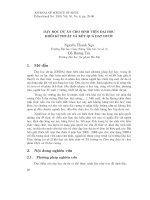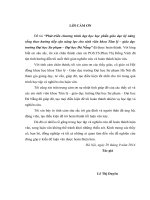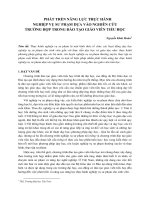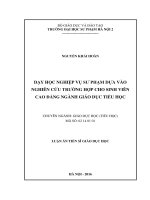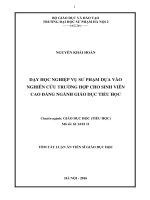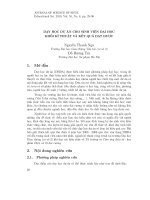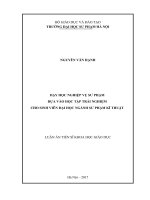Dạy học nghiệp vụ sư phạm dụa vào dự án cho sinh viên đại học ngành giáo dục tiểu học tt tiếng anh
Bạn đang xem bản rút gọn của tài liệu. Xem và tải ngay bản đầy đủ của tài liệu tại đây (460.99 KB, 27 trang )
MINISTRY OF EDUCATION AND TRAINING
HANOI PEDAGOGICAL UNIVERSITY 2
TRAN VU KHANH
PROJECT-BASED TEACHING OF PEDAGOGICAL
SKILLS FOR STUDENTS OF PRIMARY EDUCATION
Major: EDUCATION
CODE: 9 14 01 01
SUMMARY OF DOCTORAL THESIS
HANOI - 2018
Thesis is completed at HANOI PEDAGOGICAL UNIVERSITY 2
Scientific Supervisor 1 : Associate Prof. Dr Dang Thanh Hung
Scientific Supervisor 2 : Dr. Trinh Thi Hong Ha
Reviewer 1: . . . . . . . . . . . . . . . . . . . . . . . . . . . . . .
..............................
Reviewer 2: . . . . . . . . . . . . . . . . . . . . . . . . . . . . . .
..............................
Reviewer 3: . . . . . . . . . . . . . . . . . . . . . . . . . . . . . .
..............................
The thesis will be defended before the University Thesis
Examining Council at at Hanoi Pedagogical University 2 at …. (time)
on …… (date) in……(year).
The thesis can be found in :
- National Library, Hanoi
- Library of Hanoi Pedagogical University 2.
1
INTRODUCTION
1. Rationale
1.1. Practical aspect
1.2. Theoretical aspect
Results from the practical and theoretical analysis show that the
application of project-based teaching into primary school teacher
training, especially in professional training subjects, is highly relevant.
Professional skill is considered the weakest skill of primary teachers.
Project-based teaching, with such pedagogical advantages as linking
theory and practice, thinking and actions, schools and society, and its
involvement in the training of such capacity as self-reliance, creativity,
problem solving, responsibility and collaboration of learners, is an
effective solution to this problem. However, in Vietnam, there has not
been any research on the application of project-based teaching in the
teaching of professional subjects for students majoring in primary
education. Therefore, a research titled “Project-based teaching of
pedagogical skills for students of primary education” has been chosen
as the topic for this dissertation.
2. Research objectives
The objective of this research is to develop methods for projectbased teaching of pedagogical skills for students majoring in primary
education through which enhancing their pedagogical capacity.
3. Research object, subject and scope
3.1. Research object
The object of this research is the relationship between teachers‟
teaching activities and learners‟ learning activities in the process of
applying learning projects in such environmental conditions that
learning projects create.
3.2. Research subject
The object of this research is the relationship between teachers‟
teaching activities and learners‟ learning activities in the process of
applying learning projects in such environmental conditions that
learning projects create.
3.3. Research scope
Identifying theoretical foundation of Project-based teaching of
pedagogical skills for students majoring in primary education.
2
Identifying practical basis of Project-based teaching of
pedagogical skills for students majoring in primary education.
Proposing methods for Project-based teaching of pedagogical
skills in training Bachelor of primary education
Carrying out scientific experiment in order to evaluate research
results.
4. Scientific assumption
It is assumed that when methods of project-based teaching of
pedagogical skills accurately follow characteristics, principles of
designing and implementing projects, and the learning projects can
create such a collaborative environment and opportunities to experience
and practice for students, they will bring positive effects to the learing
process and results of pedagogical skills.
5. Research tasks
5.1. Identifying theoretical and pratical of the project-based
teaching for pedagogical skills training in training Bachelor of primary
education.
5.2. Proposing methods for project-based teaching for
pedagogical skills training in training Bachelor of primary education
5.3. Carrying out scientific experiment in order to evaluate
research results.
6. Methodology and research method
6.1. Methodology
This dissertation is conducted on the basis of the following
research methodologies
- System-based approach: project-based teaching in
pedagogical skills training in relation to other teaching processes in
order to realize the established goals and develop professional capacity
for students majoring in primary education
- Activity- Characteristics-based approach: Project-based
teaching for pedagogical skills training need to be conducted through
such activities as career practice and experience and it has to aim at
building pedagogical capacity in particular and professional capacity in
general for students of primary education.
- Capacity-based approach: Project-based teaching for
pedagogical skills training for students of primary education need to
3
take pedagogical capacity that students are preliminary required as
objectives and standards, and pedagogical capacity is also the baseline
to develop assessing criteria.
6.2. Research methods
6.2.1. Theoretical methods
- Analyzing, synthesizing, categorizing, systematizing, and
generalizing theory.
- Theoretical comparison and conceptualization through
modeling.
- Historic and logical methods to analyze and evaluate the
current researching context and to identify research subject and
methods.
6.2.2. Practical methods
- Investigating sociology and social psychology through
questionnaire.
- Investigating education through questionnaire, interview,
observation, statistical data analysis, teaching profile and teaching and
learning management profile.
- Utilizing practical methods to organize experimental teaching
activities with learning projects and corresponding learning activities
6.2.3. Other methods
- Employing expert method in order to evaluate research results
- Employing the mothod of scientific information and data
processing by computer-based statistic and calculation techniques.
- Utilizing case study for additional evaluation of sienctific
experiment results.
7. Arguments
7.1. Pedagogical skills account for a major propotion in the
professional capacity of primary school teachers. An important feature
of the teaching of pedagogical skills is to expose students to practice;
therefore, project-based teaching of pedagogical skills is an appropriate
and highly effective method.
7.2. There are a lot of problems in the current situation of
teaching pedagogical skills for students of primary education. It has not
met the requirement of professional practice for students in order to
4
assist them to develop pedagogical capacity in particular and
professional capacity of primary teachers in general.
7.3. In order to get the most out of project-based teaching in
pedagogical skills training in developing professional capacity of
students majoring in primary education, it is necessary to work well on
the following tasks: 1/ Selecting the teaching content of pedagogical
skills and develop them into topics for learning projects; 2/ Supporting
students in designing learning projects in accordance with the selected
topics; 3/ Developing and realizing the procedure of teaching
pedagogical skills on the basis of the designed projects, and evaluating
learning outcome.
8. Contribution of this research
8.1. In theoretical aspect
From the systematization and generalization of theories in
teaching pedagogical skills, project-based teaching, and characteristics
of the teaching of pedagogical skills for students of primary education,
new concepts of project-based teaching of pedagogical skills have been
given.
8.2. In practical aspect
- Strengths and weaknesses of project-based teaching in
pedagpgical skills training for students of primary education have been
discovered.
- Some solutions to enhance project-based teaching in
pedagogical skills training have been proposed. The solutions include
suggestions for designing project-based teaching of pedagogical skills,
building and applying teaching and learning procedure of project-based
teaching for pedagogical skills training, and some forms of learning
assessment.
- Illustrations of learning projects and activities have been given.
7. Structure of this dissertation
In addition to such parts as Introduction, Conclusion and
suggestion, References and Appendix, there are 4 chapters in this
dissertation.
Chapter 1. Theoretical foundation of project-based teaching for
pedagogical skills training for students of primary education.
5
Chapter 2. Current situation of the teaching of pedagogical
skills for students of primary education from the project-based teaching
perspectives.
Chapter 3. Project-based teaching methods for pedagogical
skills training for students of primary education
Chapter 4. Scientific experiment
Chapter 1. THEORETICAL FOUNDATION OF PROJECTBASED TEACHING FOR PEDAGOGICAL SKILLS TRAINING
FOR STUDENTS OF PRIMARY EDUCATION
1.1. Overview of the research subject
1.1.1. Researches in pedagogical skills training
1.1.2. Researches in project-based teaching
In Vietnam and many other countries in the world, there are
numerous researches and applications of project-based teaching in
almost every field. Results from researches and experiments show both
advantages and disadvantages of this teaching approach. The
disadvantages include time, teaching curriculum, facilities and the lack
of theoretical foundation. Recently, in Vietnam, there have been a
number of researches in project-based teaching at different educational
levels and majors; however, project-based teaching for pedagogical
skills training has not been particularly researched. This is such a big
mistake because the teaching of pedagogical skills really fit in with
project-based teaching method.
1.2. The teaching of pedagogical skills for students of primary
education
1.2.1. Some related concepts
1.2.1.1. Pedagogical skills
Pedagogical skills are a part in the professional capacity of
teachers, representing the uniqueness of teaching. They allow teachers
to complete their tasks on the basis of the combination of pedagogical
skills with other capacity in relation to the their teaching or educating
fields.
6
1.2.1.2. The teaching of pedagogical skills
Pedagogical skills training is a concept that shows the process and
results of teachers’ effect, influence upon students to motivate them in
learning, knowing how to learn, learning sucessfully and persistently in
order to develop such aspects as knowledge, skills, attitude in their
pedagogical capacity, and support students to develop both
pedagogical and professional capacity.
1.2.1.3. Primary education
Primary education is a primary teacher training area in the
system of educational training at universities or colleges of education,
in faculties of pedagogies or education at multi-major universities. The
vision of this major is to develop a proffesional human resource serving
for primary education level in the general education system.
1.2.1.4. Students of primary education
1.2.2. Content and features of pedagogical skills in primary teacher
training
1.2.1.1. Content
1.2.1.2. Features
a) Pedagogical skills are a unique training area of teaching
profession.
b) In learning pedagogical skills, it is absolutely vital to provide
students with a great amount of practicing, experiencing and working
with reality.
c) The content of pedagogical skills cover many knowledge
areas and skills of the teaching profession.
d) To learn pedagogical skills, it is a prerequisite that students
experience teaching and practice teaching.
1.2.3. Characteristics of students of Primary Education
1.2.3.1. Psychological characteristics
1.2.3.2. Learning characteristics
1.2.3.3. Social characteristics
1.3. Project-based teaching of pedagogical skills for students of
primary education
1.3.1. Some concepts
1.3.1.1. Project method
7
Project method is a method for development management in such
fields as economy, healthcare, education, transportation. It is then applied
in the teaching and learning process as a form of learning organization. In
the past, there were lesson-based teaching strategies, and nowadays,
project-based teaching and many other methods are added.
1.3.1.2. Learning project
Learning projects are essential in project-based teaching
method. In this dissertation, the concept of learning project can be
understood as a project that is designed and performed by learners in
the learning process with teachers’ support in order to achieve
education and learner development goals. Learning projects can create
such an environment in which there is a good harmony of learning
content and activities. Integrity, reality, cooperation and opportunities
for students to showcase themselves are all included in this method.
These elements all together create such a good combination which fit in
with the standards or learning objectives. With regrads to principles,
though learning projects at professional or vocational training
institutues strive for socio-economic development, they, first of all,
should be plan to develop learners and somehow contribute to the career
development for teachers.
1.3.1.3. Project-based learning
With project-based learning, learners learn by designing their
projects. Projects are used as tool for teachers to manage students and
their learning process, to create an ideal environment to effectively
teach the content and organize learning activities, and to apply teaching
techniques and strategies which are highly socialized. With this method,
learning projects are the content and activities of that learning unit.
Therefore, project-based learning is a method in which learning
is conducted through students designing and implementing their
projects, and learning process is the process of designing the projects
itself, and the products reflect students’ learning results though they are
normally not the same.
1.3.1.4. Project-based teaching
It can be understood that project-based teaching is a method in
which students learn through their learning projects instead of attending
8
traidtional lessons. Therefore, project-based teaching is a teaching
method or organization whose primary characteristics are to create an
active, cooperative, and friendly learning environment by learning
projects, in which learners complete learning tasks which are complex
and open, and require the combination of theory and practice. This
method requires students‟ high responsibility throughout their learning
process to create a product and introduce it in class, and they are
evaluated by their own projects.
1.3.2. Characteristics of learning projects in the teaching of
pedagogical skills for students of Primary Education
1.3.2.1. Pedagogical critera of learning projects
a) The process of project-based teaching
According to such authors as Alan & Stoller (2005), Stoller
(1997) Sheppard & Stoller (1995), project-based teaching requires 10
steps
1. Teachers and students agree upon the ideas and topics of the
projects
2. Teachers and students discuss the final project products.
3. Students design the project structure with teachers‟ support.
4. Teachers prepare students to be ready for data collection step.
5. Students collect the needed data and information.
6. Teachers prepare students to be ready for data analysis step.
7. Students analyze data.
8. Teachers prepare students the langage and skills required in
the process of conducting the projects.
9. Students present their final products..
10. Students evaluate themselves.
b) General structure of project-based teaching
Project-based teaching requires the following elements:
1. Analyzing learning objectives and content which are
appropriate to apply project-based teaching method.
2. Identifying project topic
3. Designing the projects, including techniques for evaluation
4. Evaluating students and assigning them to work in groups on
the basis of differentiation.
9
5. Preparing teaching aids, materials and other resources.
6. Implementing the designed project
7. Monitoring the process like managing learning
8. Evaluating the progress regularly
9. Evaluating the project ending
10. Evaluating project products and learning results.
1.3.2.2. Types and classifications of learning projects
1.3.3. Viewpoint on project-based teaching
1.3.3.1. Principles of project-based teaching
Project-based teaching integrate almost every teaching
techniques such as cooperative teaching, group teaching, problem-based
teaching, constructive teaching, case study-based teaching, capacitybased teaching. Therefore, this method follow different sets of priciples
though it can be relatively differentiated from other teaching methods.
Project-based teaching, in fact, is cooperative teaching, but it leans on a
project environment rather than a class or group environent as usual,
and it is also teaching and learning from experiencing. Hence, the
principles of project-based teaching are from the combination of
cooperative teaching and experience-based teaching.
1. The positive interdependence in learning process and
learning outcomes.
2. Individual responsibilities and tasks in learning
3. Direct interaction in order to increase learning opportunities
4. Teaching is primarily through and depend on social skills.
5. Collaborative group management
6. Probematic features of learning content, mainly the social
ones.
7. The involvement of everyone in all aspects.
8. Exploring and working in order to achieve the final products
and in the context that learning content is unavailable.
9. Self-reliance and successive prositivity of learners.
1.3.3.2. The characteristics and roles of the project-based teaching
of pedagogical skills
a). Characteristics
- The topic of the project relfect pedagogical content
10
-
Learning pedagogical skills is the process of conducting the
projects.
- Learning outcomes are reflected in the final project product and
its process.
- Students‟ self-evaluation is included in assessment.
- Teaching is the process of action guiding and problem solvin
b) Roles
- Focusing on professional skills
- Creating opportunities for students to experience
- Encouraging collaboration and sharing
- Practicing problem solving capacity
- Creating an open and active learning environment
Summary of chapter 1
1.1. Pedagogical skills training accounts for a major propotion
in Primary Education training curriculum. However, the scientific
concept of pedagogical skills has not been clearly identified. Therefore,
the learning content of this aspect has not been well and effectively
organized. Pedagogical skills should be understood as a great part of
teachers‟ professional capacity which differentiate teaching profession
from others.
1.2. There have been numerous researches on project-based
teaching of traditional subjects at general education schools and
universities. They are strong evidence of the applicability of projectbased teaching in a wide rage of subjects, including pedagogical skills.
As long as the subjects have such concrete learning content as
knowledge, skills, attitude, this teaching methods are highly applicable.
1.3. Project-based teaching has not been applied in the teaching
of pedagogical skills due to several reasons. Some people think that it is
time consuming and labor intensive. Some keep the belief that the
structure and content of teaching pedagogical skills are unsuitable for
the application of project-based teaching. Those believes show that
project-based teaching has not been fully taken advantage of in the
teaching of pedagogical skills.
11
CHAPTER 2. THE CURRENT SITUATION OF PROJECTBASED TEACHING OF PEDAGOGICAL SKILLS FOR
STUDENTS OF PRIMARY EDUCATION IN SOME SELECTED
UNIVERSITIES OF EDUCATION
2.1. The general situation of teaching pedagogical skills in some
selected universities of education
2.1.1. Training programs of Pedagogical skills
2.1.2. Learning and teaching methods of Pedagogical skills
2.1.3. Evaluating the learning result of Pedagogical skills
2.2. Survey
2.2.1. Purpose, scale, location and participants
2.2.1.1. Purpose
To evaluate the training of pedagogical skills for Primary
Education students and the application of PBT in a number of content
areas
2.2.1.2. Scale, location and participants
The sample consists of 640 participants.
Period of survey: from September 2014 to September 2017
2.2.2. Survey content and methods
2.2.2.1. Content
- The teaching of pedagogical skills
- The awareness of Project based teaching
- The application of Project based teaching
2.2.2.2. Survey methods
- Survey questionnaire
- Experience, Interview, Profile analysis, Observation
- Data processing with statistics, quantitative assessment,
qualitative assessment.
2.3. Analysis
2.3.1. The teaching of pedagogical skills
2.3.1.1. Teaching methods of pedagogical skills
2.3.1.2. Teaching strategies of pedagogical skills
2.3.1.3. Effectiveness of teaching pedagogical skills
2.3.2. The awareness of Project-based teaching
12
2.3.2.1. Understanding of PBT characteristics
2.3.2.2. Understanding of PBT principles
2.3.3. The application of Project-based teaching
2.3.3.1. Types of projects applied
2.3.3.3. Benefits of PBT in teaching pedagogical skills
2.3.3.4. Effectiveness of PBT in teaching pedagogical skills
2.3.3.5. Assessing the common procedure of PBT in teaching
pedagogical skills
2.4. General remarks
2.4.1. The teaching of pedagogical skills
The teaching of pedagogical skills has not changed significantly
since the last few decades. There are more subjects which consume
more time. The current status is a huge waste of time for vocational
training, especially skills, and lack of connection to focus on capacity.
2.4.2. The awareness of Project-based teaching
There is a great deal of discussion about project based learning
in books, workshops and training courses of many educational projects.
Lecturers and students have certain knowledge about PBT, which is a
good condition to expand and promote the application of this strategy in
higher education. This is a necessary condition. They have heard and
learned quite a lot about PBT through books, so the issue of theoretical
teaching has been reduced. The remaining problem is the ability to
implement this strategy in teaching practice. This is not just a matter of
purely technical expertise but is closely related to the management of
training. If the structure and organization of the training program is still
rigid in the discipline style, it is only possible to apply PBT in separated
parts and fragmented settings.
2.4.3. The application of Project-based teaching
Surveys and interviews show that teachers and students in
general have realized the need for modern teaching strategies to teach
pedagogical skills, meeting the requirements of training primary school
teachers. In addition, teachers and students have an initial understanding
of project-based teaching. However, their awareness is limited, they
could hardly understand its nature, especially teaching pedagogical
skills in training primary school teacher with the aim of developing
13
learners‟ professional capacity. Therefore, there should be incentives or
compulsory application of PBT and other effective teaching strategies
in teaching pedagogical skills.
Surveys, interviews and observations show that PBT is not
applied systematically in teaching pedagogical skills at primary school
teacher training institutions. Some institutions only use subject projects
that do not really reflect the nature of PBT and they have not yet
generalized into the methods, techniques of selecting and designing
projects and hands-on experiences at primary schools. Typical projects
associated with the current innovation of education such as teaching by
topic, professional activities in the format of "lesson study", capacitybased evaluation have not been selected and designed.
The difficulties and challenges of applying PBT in teaching
pedagogical skills shown in surveys, observations and interviews mean
that it is necessary to make changes in the regulation, management,
content and training programs. There must be detailed instruction,
training workshops and practice of teaching pedagogical skills at
primary schools. The number of teachers applying PBT in teaching
pedagogical skills is limited. Some teachers use PBT as a teaching
method but the project is still small, not typical in teaching pedagogical
skills. No guidance for using the knowledge of "Inter-discipline",
"transdisciplinary integration” in learning pedagogical skills is given for
students.
Chapter 2 – Conclusion
2.1. Although there are a few changes in contents of teaching
pedagogical skills in teacher training, not many renovations can be seen
in teaching methods and strategies. Despite the fact that some modern
techniques such as discussion, brainstorming, lesson study, problem
solving, collaboration are applied, the conventional learning – teaching
method accounts for most of the time.
2.2. The learning of pedagogical skills has been positive, but
not really effective due to the lack of hands on experience and practical
application. In fact, students are better at the theory than the real skills
to work. There are no effective strategies and methods to teach
pedagogies, especially pedagogical skills. Primary teacher training
14
institutions have not changed the way they organize and design training
programs, thus the application of effective teaching strategies have not
been possible.
2.3. PBT has been theoretically accepted and applied quite
successfully in many disciplines such as Medicine, Agriculture,
Industry, Management Science, Forestry, Business, etc. That strategy
has not been applied as much in teacher training institutions. Some
cases claim to be PBT but turn out to be topic-based learning instead. In
pedagogical skills teaching, there has been almost no PBT model.
Teachers and students are well aware of the theory of PBT, but in
reality they have not practiced it properly. They also pointed out the
obstacles, mainly due to lack of time and hard work. Moreover, they are
not obliged to apply PBT. The conventional teaching practice is still
applied. There are no reasons for changes, which takes more time and
energy with no compensation.
CHAPTER 3. PROJECT-BASED TEACHING METHODS IN
TEACHING PEDAGOGICAL SKILLS FOR STUDENTS OF
PRIMARY EDUCATION
3.1. Designing Project-based teaching activities in teaching
pedagogical skills
3.1.1. Instructing students to design learning projects
3.1.1.1. Supporting students in selecting project topics
a) Characteristics of teaching pedagogical skills in primary
school teacher training
- There are few interdisciplinary parts and many independent
parts
- Integration between theory and practice is not strong
- Practicality and professionalism is not high
- Experiencing activities are relatively simple
b) Some pedagogical topics to design learning projects
Almost all of pedagogical contents in subjects and courses can
be transformed into project topics if they are identified and addressed as
15
professional skills of primary teachers. They can be common for many
teaching areas or specific for each subject. The pedagogical content in
the teaching methodology of each subject is very rich, most of which
can be transformed into skills. One or a group of skills can be project
topics, for example, Science lesson planning for primary students,
Experiential science teaching method, Conversational language
teaching method for primary students. Lecturers suggest a series of
topics for students to select through group discussion or their own way.
Lecturers can give advice when necessary.
c) Project content
The content of the project should be clarified: 1) What are the
activities of the project?; 2 / What role does the activity play in
achieving the whole project goal? Activities can be designed upon the
problem to be solved or the content structure of the topic. Each small
topic, or a topic that needs to be addressed, can be developed into one or
several different learning activities.
Main activities students have to accomplish include: practicing,
doing research, problem solving, brainstorming ideas, discussing to
determine end products, designing and structuring, collecting data,
analyzing data, evaluating, selecting and processing data, developing
group work plan, preparing means, resources, preparing off-site
learning environment, demo-presenting, presenting, planning and
evaluating the product and procedure.
3.1.1.2. Designing principles
- Ensure clarification of learning objectives and final product
for evaluation
- Ensure the meaningfulness of learning contents, mainly social
and highly practical issues
- Ensure student self-reliance
- Ensure complexity and interdisciplinary link between learning
content and activities
- Combine shared activities and individual activities in learning
3.1.1.3. General technical structure of the learning project
3.1.2. Design teaching methods to support students
3.1.2.1. Design suitable teaching methods for project-based
16
learning and pedagogical skills learning
3.1.2.2. Design contingency plans when consulting and supporting
students
3.2. Develop and implement a project-based procedure in learning
and teaching pedagogical skills
3.2.1. Project-based procedure in learning pedagogical skills
3.2.1.1. Read materials, collect necessary data
3.2.1.2. Assign individual and group tasks
3.2.1.3. Team work
3.2.1.4. Create the final product of the project
3.2.1.5. Evaluate project outputs and learning outcomes
3.2.2. Project-based procedure in teaching pedagogical skills
3.2.2.1. Group and assign tasks
3.2.2.2. Give guidance on implementing learning projects
3.2.2.3. Implement the projects
3.2.2.4. Report project outputs
3.2.3. Instruct, supervise the learning process
3.3. Project-based learning assessment measures
3.3.1. Self-assessment and peer evaluation in project implementation
3.3.1.1. Self-assessment
3.3.1.2. Peer evaluation
3.3.2. Evaluate project-based learning outcomes
3.3.2.1. Evaluate project outputs
3.3.2.2. Evaluate learning outcomes
3.4. Illustrate with some project designs and student activities
3.4.1. The skill of using questions in teaching at primary school
3.4.2. The skill of designing teaching methods at primary school
Chapter 3 - Conclusion
3.1. Project-based teaching methods for the teaching
pedagogical skills has clearly demonstrated the principles of PBT and
the requirement of teaching pedagogical skills is to focus on
professional skills. There are impacts on students' activities such as
cognitive, communication, experience, collaboration, evaluation, selfassessment, theoretical study, practice, independent project design and
implementation.
17
3.2. The role of students is encouraged to the highest level. The
role of teacher is to provide consultation in both design and
implementation steps. Students have to work hard and throughout the
project implementation, they always need to self-assess and evaluate
each other on the process and results under clear criteria.
3.3. Project-based learning assessments consist of two parts: 1)
evaluation of the intermediate and final product of the project; 2 /
Evaluate the specific learning outcomes that students must achieve
through the project. Assessment of learning outcomes should be based
on the nature of the knowledge, competence or skills that the project
aims at. If the expected result is a pedagogical skill, that skill must be
evaluated.
Chapter 4: SCIENTIFIC EXPERIMENT
4.1. Overview of the experiment
4.1.1. Purpose, scale, and location of the experiment
4.1.1.1. Purpose
- Check the correctness of the proposed scientific hypothesis
- Assess the feasibility and effectiveness of project-based
methods for pedagogical skills training; specifically, teaching the skill
of developing methods for teaching primary students as one of the
important pedagogical skills.
4.1.1.2. Location
The experiment is carried out at the faculty of Primary
Education - Ha Noi Pedagogical university 2 (HPU2). HPU2 has gained
good reputation for primary teacher training, has good teaching facility,
teaching and learning materials can support project-based teaching,
highly skilled and experienced teachers who are qualified for
undergraduate education.
4.1.1.3. Scale and participants
The participants are freshman and sophomore at Faculty of
Primary Education (school year 2012-2016 and 2013-2017). They are
K37 and K38 students.
4.1.2. Experiment content and methodology
4.1.2.1. Experiment content
18
Implementation of the project “Developing teaching methods
towards positive learning at primary schools” to assess the feasibility
and effectiveness of project-based methods for pedagogical skills
training; specifically, teaching the skill of developing methods for
teaching primary students. This is an important pedagogical skill.
The project “Developing teaching methods for primary
students” integrates contents of such subjects as Education and
Teaching Science for Primary Students Methodology. The project
duration includes 3 hours in class + 9 hours of group work (36 hours of
self study).
Through the project implementation, the experiment of methods
for pedagogical skills training are applied in developing teaching
methods is an important pedagogical skill that students need to
perceive. It is also to assess the feasibility and effectiveness of those
methods in real teaching and training.
4.1.2.2. Experiment methods, techniques, and procedures
a) Data collection
- Observation: Evaluating students‟ performance in employing
standard procedures and techniques for developing teaching methods,
level of proficiency, flexibility, and creativity in implementing
techniques. Using evaluation form to evaluate level of achievement of
individual and project group.
- Analysis of project‟s products: Analyzing the intermediate
products basing on projects including learning materials that students
collect (summary report), group discussion reports, discussion minutes,
self-assessment minutes, mutual evaluations, and group work
assessments, etc. and the final product is a document which develops
teaching methods when they teach a science topic to grade 5th students
and explanation for their methods.
- In-depth interview: Using in-depth interview questions to
collect information on the level of students‟ understanding of theory
about teaching methodology and developing teaching methods, and
plan for individual as well as group activities.
- Case study: Randomly selecting from experimental group and
control group 3 students each and asking them to develop a specific
19
teaching method (for example: group discussion methods) for a grade
5th scientific lesson or a scientific topic, observing the level of skill
proficiency and the designed product quality.
2. Evaluation criteria
Criterion 1. Students’ attitude towards self- practice
Criterion 2. Evaluate products of developing teaching
methods
Criterion 3. Skills of developing teaching methods towards
positive learning
3. Skills rating and evaluating
4.1.3. Experiment duration and methods of conducting
4.2. Analyze experiment results
4.2.1. Evaluation techniques and tools
4.2.2. Experiment results
4.3. Experiment general evaluation
Experimental process uses a variety of tools and methods of
evaluation, with the participation of related parties (student selfassessment, assessment of the university lectures), initial qualitative and
quantitative results obtained is the basis for comments on the process of
training skills for developing teaching methods for project-based
methods for pedagogical skills training. The comments are as follows:
- The quantitative data on learning outcomes, training skills
results and the products of the training process, the research results
show that there are some progress made by students in both the control
group and experimental group. However, Students in the experimental
group make more progress, the proportion of students who meet the
basic requirement of proficiency is high and very high.
Students in the experimental group note only acquire
proficiency in using basic techniques to develop teaching methods, but
also enhance skill effectiveness in doing so. Their products of
developing teaching methods have met the requirement for innovation
in high schools; these products are highly evaluated by teachers and
managerial staff in high schools. In comparison with students in the
control group and students with lower level of training, students in the
experimental group also show great difference in workmanship.
20
- Students in the experimental group are also in higher
inquisitive spirits. Students can choose to learn what they are interested
in and follow their own preferable learning styles. Moreover, using
project-based learning, students achieve multiple goals at the same time.
They gain more understanding about science principles through real
experience, self-study, and self-study for application. They are trained
to overcome difficulties and complete their tasks, to corporate with
others, share responsibility, be confident in communication, and
improve problem-solving skills. They can practice in an extensive
environment and space, have real experience, and apply ideas and
creativity into practice. Besides, according to teachers, students in the
experimental group are proficient and creative in using ICT in
developing teaching methods.
Students in the experimental group can develop teaching
methods in a variety of learning strategies innovatively and effectively
which suit a variety of learning styles. They show creativity in choosing
and using skills to apply teaching method; develop teaching tools that
are suitable for new teaching strategies and teaching skills. They can
assess the effectiveness of the developed teaching methods, become
experts in assessing developed teaching methods when they discuss.
Through the experiment, the author also identifies difficulties
that arise during the project-based teaching for pedagogical skills
training.
Time constraints: Due to the limited time for each subject,
teachers and students have to use extra time to complete the experiment.
It is difficult to arrange the learning schedule and other activities to
carry out the project. Students are used to individual study, coordinating
in working is not familiar to the students. Therefore, teachers have to
spend a great amount of time and effort to train such skills for students
as listening to each other skills, sharing and collaborating skills.
Project-based teaching requires teachers to prepare and
complete a much greater amount of work than usual even though
teachers‟ main task is to guide and give advice. Teachers using
traditional methods of teaching only assign homework and the students
have to hand in their work for marks. In contrast, in project-based
21
teaching, teachers have to suggest topics, plan the project-based
teaching with students, search information to direct students in choosing
leaning materials, design evaluation form, follow up the working
process to monitor and give help, etc. This is the most challenging part
that teachers have to overcome when using project-based teaching.
However, the experiment also shows that project-based teaching gives
students many benefits when they are trained to develop teaching
methods and many other working skills. The experiment results have
proved the feasibility and effectiveness of using project-based teaching
for pedagogical skills training through the training of developing
teaching methods. The results also support the science hypothesis
proposed.
Conclusion of chapter 4
4.1. The experiment results show that most pedagogical skills
can be taught using project-based model. It is important to have
appropriate measures and techniques. Teaching working skills is an
advantage of this project-based approach. It becomes even more
appropriate for pedagogical skills in teaching job.
4.2. Students gain a lot of vital social skills and values
important to the teaching profession such as collaborative skills, project
management skills, teamwork skills, social skills, conflict management
skills, interpersonal skills, etc. beside many valuable qualities through
experiment. Teaching pedagogical skills in individual subject hardly
helps students gain these qualities.
4.3. The experiment results also illustrate that methods of
teaching pedagogical skills have positive effect on students pedagogical
skills learning results as well as students‟ training of skills. These
factors are significantly improved in the experimental group when
comparing them to the control group and comparing the input and
output in the experimental group. Statistical and T-test techniques show
that the difference is not accidental and that the change is truly reliable.
22
CONCLUSION AND RECOMMENDATIONS
1. Conclusion
1.1. There has not been a clear conception about pedagogical
skills. Therefore, the content of pedagogical skills is still not well
organized and conducive to teaching. It is essential to understand that
pedagogical skills are a apart of professional capacity of teachers
which are characteristics of teaching profession and other professions
do not have. There have been many studies on using project-based
teaching in teaching traditional subjects in high schools as well as in
universities. This shows that the applying project-based teaching is
feasible broadly. Project-based teaching has not been used to teach
pedagogical skills for a number of reasons, including the inaccurate
viewpoint about pedagogical skills. These opinions suggest that the
issue of using project-based teaching for pedagogical skills training
has not been properly studied yet.
1.2. The general situation of teaching pedagogical skills in
teacher training programs is that there are many changes in teaching
content, but teaching methods and strategies have not been changed
much. The teaching style of lessons - the class still dominates despite
the fact that some modern techniques such as discussion, brainstorming,
lesson study, issue raising, co-learning etc. are used. Students‟ learning
of pedagogical skills is positive but not really effective because it still
depends on traditional methods of teaching with less experience and
lack of practical application. In other words, students know the theory
of working skills more than having the real skills to work. There are no
effective strategies and methods for pedagogical skills training,
especially pedagogical skills.
Project-based teaching has not been applied much in
pedagogical schools. Some schools apply this method but it is topicbased teaching not truly project-based teaching. There is almost no
effective project-based teaching model in pedagogical skills training.
Lectures and students in pedagogical schools do understand theory
about project-based teaching, but they do not actively involve in the use
of this method. They point out the obstacles, mainly due to hard work
and the lack of time.
1.3. Project-based teaching for pedagogical skills training has
clearly demonstrated the principles of project-based teaching and that
the requirements of pedagogical skills training are to focus on
professional skills. There are effects on students' activities such as
cognition, communication, experience, collaborative working,
23
assessment, self-assessment, theoretical study, practice, planning and
carrying out project independently. In project-based teaching for
pedagogical skills training, students are encouraged to take the center
role. The role of teacher is to consult and give suggestions in both
planning and carrying out the project. Students must work really hard
and throughout the project they need to self-evaluate and evaluate each
other, evaluate in group the working process and results basing on clear
criteria. Project-based learning assessments consist of two parts: 1)
Evaluate the intermediate and final product of the project; 2 / Evaluate
the specific learning outcomes that students must achieve through the
project.
The experiment results show that most pedagogical skills can be
taught and practiced using project-based teaching. Teaching working
skills is an advantage of this project-based approach. Students gain a lot
of vital social skills and values important to the teaching profession
such as collaborative skills, project management skills, teamwork skills,
social skills, conflict management skills, interpersonal skills, etc. beside
many valuable qualities through experiment.
The experiment results also illustrate that methods of teaching
pedagogical skills have positive effect on students pedagogical skills
learning results as well as students‟ training of skills. These factors are
significantly improved in the experimental group when comparing them
to the control group and comparing the input and output in the
experimental group. Statistical and T-test techniques show that the
difference is not accidental and that the change is truly reliable.
2. Recommendations
2.1. To primary school teacher training institutions at university
level.
Re-organize pedagogical skills training content and have
capacity-based and skill-based teaching approaches, to avoid longstanding ramifications that make teaching direction unclear.
Pedagogical skills are specialized for teaching profession, but they have
not made teaching profession a professional job.
Extend the application of modern teaching strategies including
project-based teaching in pedagogical skills training. It is difficult to use
project-based teaching for pedagogical skills training due to the lack of
content focus and the fact that there are many separated subjects in
pedagogical skills training. That is contrary to the teaching profession.
It is the pedagogical skills training content that is most relevant to
project-based teaching if we organize it properly.
